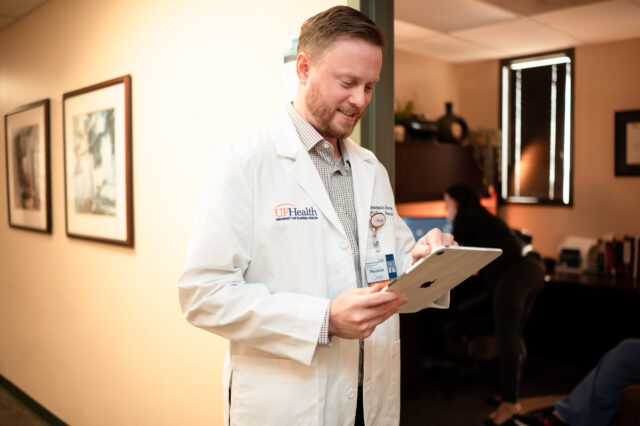Ask the Doctor: What are the symptoms of a stroke?
May is National Stroke Awareness Month. To learn about stroke symptoms, we talked with Benjamin Alwood, MD, University of Florida assistant professor of vascular neurology at UF Health Jacksonville and stroke specialist.

Do you know the symptoms of a stroke? Being able to recognize the warning signs in a loved one and calling 911 immediately can make the difference between recovery, disability or death. We asked Benjamin Alwood, MD, University of Florida assistant professor of vascular neurology at UF Health Jacksonville, what symptoms to look for and why it’s so important.
Q. What are the symptoms of a stroke?
A. To improve stroke recognition, one internationally used acronym is BE FAST: Balance, Eyes, Face, Arms, Speech and Time. First, it reminds you that one of the most important things you can do is get to the hospital quickly. The sooner you or a loved one get to the hospital the better.
BE FAST
Balance: Loss of balance, headache or dizziness
Eyes: blurred vision
Face: One side of the face is drooping
Arms: Arm or leg weakness
Speech: Speech difficulty
Time: Time to call for ambulance immediately
Q. Why is it so important to get to the hospital immediately?
A. There was no treatment for stroke until 1995. Now we have therapies that can reduce disability in patients who’ve had a stroke, but there is a preferred treatment window of about 4.5 hours. We do treat strokes up to 24 hours, but getting there sooner makes you eligible for more therapies and offers you a better chance of recovery. If you receive treatment within an hour from the onset of symptoms — we call this the golden hour — you’re four times more likely to have a full recovery.
Yet, information collected in Florida by over 150 hospitals shows that the average time to recognize stroke symptoms and call 911 is 301 minutes or 5 hours. So most people are waiting too long to go to the hospital, and it’s unfortunate.
Q. What is a stroke?
A. Stroke occurs when the blood flow to the brain is cut off for a long enough period of time to cause damage to that area of the brain. This is the most common type of stroke termed an ischemic stroke. In the United States, stroke is the leading cause of disability and the fifth leading cause of death.
Q. What causes a stroke?
A. Stroke is a cardiovascular disease, so all of the typical things that would cause a heart attack will also cause a stroke: high blood pressure, diabetes, high cholesterol, smoking, obesity, metabolic syndrome and sedentary lifestyle. Most of the time it doesn’t just pop up out of nowhere. Many strokes can be prevented by controlling these risk factors making it less likely that you’ll have a stroke in your life.
Q. What do you recommend as the best preventions for stroke?
A. I think the American Heart Association has recommended some good guidelines on this including:
- Limit salt to less than 2,000 milligrams per day
- Limit cholesterol to 300 milligrams per day
- Follow a Mediterranean diet that focuses less on processed foods and more on fruits and vegetables and lean meats
- Include a minimum of about 150 minutes of mild to moderate exercise each week
- Stop smoking
I think an ounce of prevention is worth a pound of acute treatment. Living a healthy lifestyle will help you prevent stroke and heart disease. What’s hard is they are silent illnesses. You don’t know you have high blood pressure, high cholesterol or diabetes until a clinician checks for these, so I think at least having a physical once a year and maybe even more often in higher risk patients.
Q. What stroke research are you doing currently?
A. Overall, my research aims include stroke quality improvement, telemedicine, using advanced intracranial imaging to improve acute stroke treatment. Right now I’m working on an NIH trial for secondary stroke prevention called Sleep SMART, which stands for Sleep for Stroke Management and Recovery Trial. The trial is exploring whether treating obstructive sleep apnea can prevent another stroke from occurring. I am also involved with CREST-2, which is an international study for patients with carotid vessel narrowing.
A note from UF Health Jacksonville: The information provided is for educational purposes only and is not a substitute for professional medical advice from an examining physician or other appropriate health care provider.